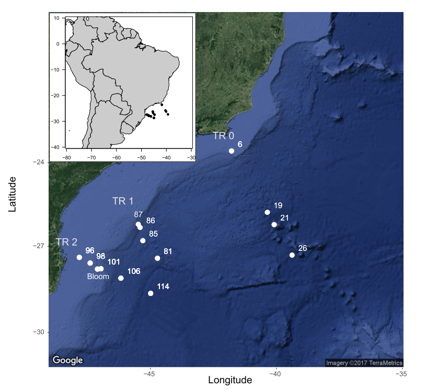2017-2019 - Catalyst (New Zealand)
Objectives
The objective of this research is to develop and implement the use of high-throughput sequencing techniques to assess the diversity and community structure of planktonic systems. This objective will be achieved merging the French team world class expertise in high-throughput sequencing and genomic approaches with the NZ teams chemical and biological oceanographic expertise and field-sampling capacities. In addition to filling a fundamental knowledge gap, joint-field research project will provide a reference baseline against which detect/evaluate changes in the pelagic ecosystem structure and function in response to environmental changes associated to human-derived activities (e.g. climate change, ocean acidification).
Partners
- New Zealand - NIWA (Andres Gutierrez, Linn Hoffmann, and Moira Decima)
- France - Station Biologique de Roscoff (Fabrice Not, Ian Probert, Daniel Vaulot, Adriana Lopes dos Santos)
Cruises
- Campbell Plateau - May 2017
- Ross Sea - Feb 2018
- Salp - Oct - Nov 2018
2017-2019 - MicrAntar (ECOS-Chili)
Inter-annual variation of Microbial Eukaryotic Communities in Antarctica
Objectives
Size-fractionated samples of microbial eukaryotes collected at a fixed station at Fildes Bay, King George Island, Western Antarctic Peninsula, will be analyzed in terms of taxonomic diversity. Diversity of microbial eukaryotes will be accessed during five consecutive summers, in order to analyze the central patterns of summer inter-annual variation in microbial eukaryote communities, and the differences between size fractions. The integrated use of high throughput amplicon sequencing, multivariate statistical analysis and network analysis will allow us to link the taxonomic information with the environmental information and determine the amount of variability explained by environmental variables measured.
Funding
ECOS-Sud grant number C16B02
Partners
- Chili - Universidad Mayor (Nicole Trefault) / Pontifical Universidad de Chile (Rodrigo de la Iglesia)
- France - Station Biologique de Roscoff (Daniel Vaulot, Adriana Lopes dos Santos)
2015-2018 - PicoBras (COFECUB, CAPES France- Brasil)
Picophytoplankton in the tropical South West Atlantic off Brazil
Objectives
The PicoBras project focuses on the taxonomic diversity of small picoplanktonic algae, their control by viruses, and their potential contribution to carbon biomass and nitrogen fixation in Brazilian South West Atlantic waters. The pico-phytoplankton off Brazil has received much less attention that the larger cells such as diatoms, dinoflagellates or coccolithophorids that produce short-lived blooms. However pico-phytoplankton contributes to the back bone of oceanic production in off-shore waters. The project associates one team from France (D. Vaulot, Roscoff) with an internationally recognized expertise in studies on plankton diversity and ecology and one team from Brazil (F. Brandini, São Paulo) with a very good knowledge of environmental conditions and phytoplankton production in the South West Atlantic Ocean. The project was developed within the framework of the Brazilian CNPq-INCT project “Caracterização Ambiental e Avaliação dos Recursos Biogênicos e Oceânicos na Margem Continental Brasileira - CARBOM”, taking advantage of seasonal cross-shelf transects sampled during CARBOM cruises. The project combines several approaches: applying the latest advances in gene analysis to characterize natural populations, in particular meta-barcoding, assessing the role of picophytoplankton in open-ocean symbioses, determining its susceptibility to viral infection. The data obtained will bring a better understanding of the role of this important group of phytoplankton in tropical waters of the Southwestern Atlantic and will be crucial for predictions of shifts in communities in response to global change and better ecosystem-based fishery management, which are among the main targets of CARBOM.
Funding
CAPES-COFECUB grant number Te871-15
Partners
- Brazil - Universidad de São Paulo (Frederico Brandini, Catherine Gerikas-Ribeiro)
- France - Station Biologique de Roscoff (Daniel Vaulot, Adriana Lopes dos Santos)
.
